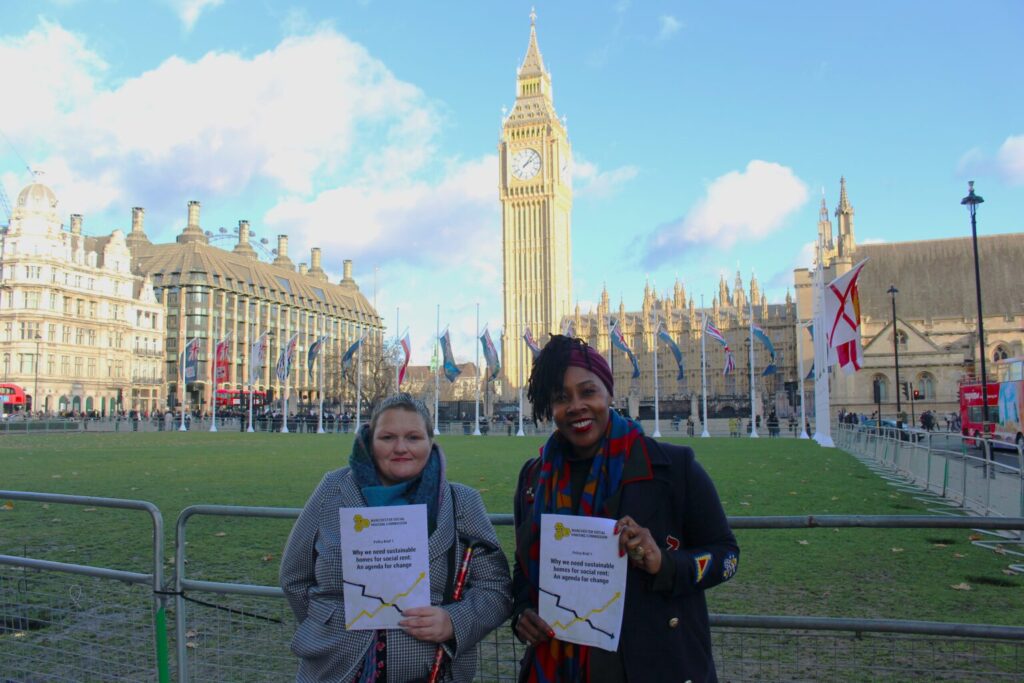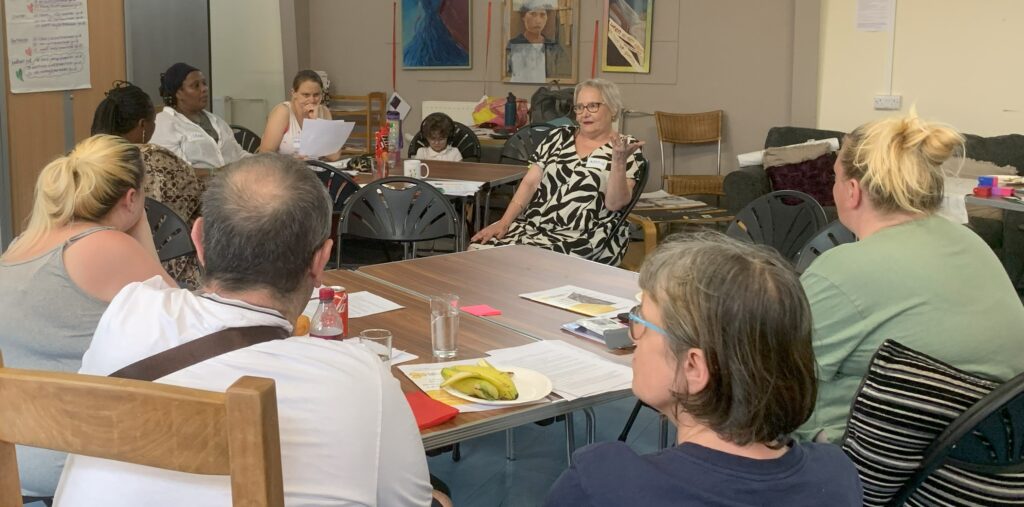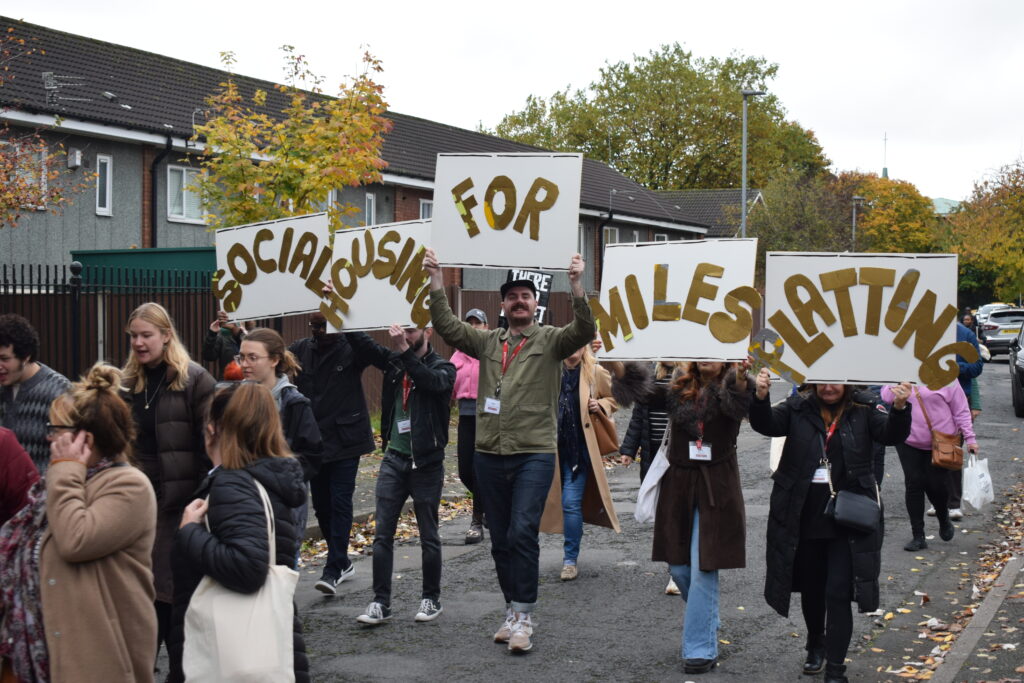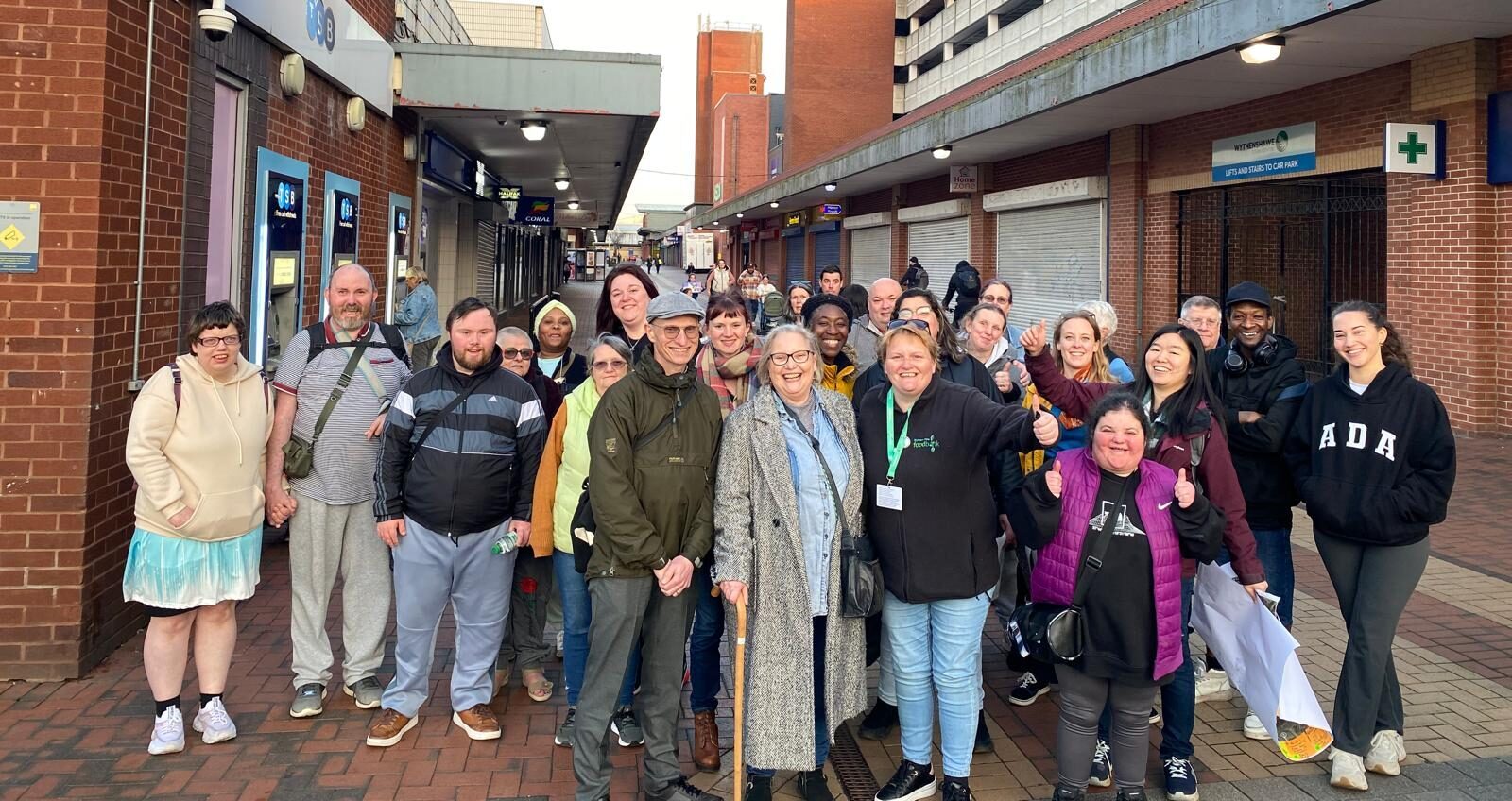What does Reeves’ announcement mean for Manchester’s homeless and overcrowded families?

The Manchester Social Housing Commission welcomes Rachel Reeves’ announcement of £39 billion for social and affordable housing, but questions remain on social rent..
Residents from some of Manchester’s most disadvantaged neighbourhoods today broadly welcomed the Chancellor’s promises of increased funding for new and existing social and affordable housing but deep concerns remain about the cost of living crisis.
Zoe Marlow, Manager of Dandelion Foodbank in Wythenshawe and Community Commissioner said:
“It’s great to hear that the government has nearly doubled investment in affordable and social housing, but I am really worried about the proposed 10 years of above inflation rent increases they have announced in combination with all the welfare cuts.
Here in Wythenshawe, there is a lot of disability – I myself have a long term condition – so a lot of people can’t work – if they are putting up rents, they also need to make sure people have enough to live on. I see mums every week at the food bank who can’t afford to feed their children because of the cost of living crisis so how are they supposed to find even more rent with no additional income for food?”
The Manchester Social Housing Commission was launched in July 2024 in partnership with Manchester City Council, housing and climate justice charities and other social landlords in the city. Commissioners have been producing evidence about the need for a massive boost in long-term investment in sustainable homes for social rent and certainty over rent increases to help social housing providers build more homes and refurbish their existing stock.
Bishop of Manchester, Dr David Walker, who chairs the Commission said:
“We are delighted to see that Government is listening to the many and diverse communities, charities, local authorities, and providers across the country who have been raising their voices for so long on the need for urgent action on the housing crisis.
£39 billion is certainly going to help. But the government needs to go further and commit the majority of that funding to building new homes for social rent with clear and enforceable targets.
Otherwise, we fear that this investment will mainly go towards so-called Affordable Rent, which is usually 80% of market rent and will not help clear the 19,000 households on Manchester’s housing waiting list or the 3000 households living in temporary accommodation.”
The Comprehensive Spending Review (CSR) contained a number of other positive announcements on housing, including protecting spending on homelessness and rough sleeping, more money for early interventions to prevent homelessness and to support local authorities in England to increase the supply of good quality temporary accommodation and drive down the costs of private provision.
The Warm Homes Plan will also help to cut bills by hundreds of pounds per year for families across the country by upgrading homes through insulation, heating and solar panels.
It comes however in the same week that MPs have been debating the Planning & Infrastructure Bill which is currently a missed opportunity to ensure that these funds for new homes will meet requirements for social rent and sustainability, including a failure to ensure national targets for the number of social rent homes required.
Dr James Vanderventer from Manchester Metropolitan University who also sits on the Commission said:
“There is a lot of good news in the CSR, but building new homes for social rent at scale needs more than just capital and rental income. The government should look at our proposals for changing existing rules on grant funding to enable more flexibility, how to unlock cheaper land for social housebuilding, increase local authority capacity to build, re-use existing empty homes and use the tax system in more innovative ways to incentivise building and retrofitting, and create new revenue streams to help fund it.”
The Manchester Social Housing Commission launched their second policy brief – How to fund and deliver sustainable homes for social rent – ahead of Reeves’ announcement setting out a range of innovative measures through which investments could be made into homes for social rent together with the cost savings that are achieved through social rent delivery.
The Commission’s first policy brief was launched by Community Savers representative for Wythenshawe Central Network Zoe Marlow, and Thirza Amina Asanga Rae in the House of Lords in November.

The Untold Stories of Manchester’s Housing Crisis

Tenants need to join forces across Manchester neighbourhoods. This was the key message arising from SH4M’s first film screening and campaign workshop at St Cuthbert’s church in Miles Platting in February.
This was the first in a programme of events that will take place across the city throughout 2025.
What is the City but the People? is a short film co-created by two inspiring women leaders from Moss Side and Wythenshawe to raise awareness about the urgency of the housing crisis across the city.
MPCAN (Miles Platting Community and Age-friendly Network) were the first coalition to host the SH4M campaign to screen the documentary and raise awareness with their local community about easy and urgent actions they themselves can take to support the collective effort to get more social rent homes delivered across the city.
A key focus of the current work is the new Local Plan which will be published for an 8-week consultation in Summer 2025 by Manchester City Council.
Download our Local Plan Handbook here
Download our Campaign Information booklet here
Planning can be very technical and boring! But if you were ever going to engage in planning this is the policy to wake up to! The Local Plan will determine how much housing, what types of housing, and where housing will be developed across the city for at least the next ten years.
Councillors Carmine Grimshaw and June Hitchen were in attendance and promised to add their pledges in support of our headline campaign ask which is for 30% of all new housing developments of 10 homes or above to be homes for social rent. You can view the full list of which councillors have pledged their support here.
You can invite Social Homes for Manchester to come and fun a film screening and workshop in your local area – just email socialhomes4mcr@gmail.com.
Launch of the Manchester Social Housing Commission

The Manchester Social Housing Commission held its first meeting in July bringing Community Savers leaders together with cross-sector experts to develop local and national proposals for addressing the housing crisis. The Commission is chaired by the Right Reverend Dr David Walker, Bishop of Manchester and supported by the Social Homes for Manchester campaign.
Community Savers representatives from Collyhurst, Miles Platting, and Wythenshawe advocated for 30% of all new housing developments of ten homes or more to be social rented homes that are climate and nature friendly. They also asked housing sector professionals to stop using the term ‘affordable housing’ and refer to housing for social rent or private rent. Communities often think affordable means social, and it prevents them holding developers and the council to account for building the social homes we need.
Zoe Marlow of Dandelion Savers and Women of Wythenshawe said:
“We need to stop blurring the line between social homes and affordable homes and just say which one is which. People are confused.”

The lack of information provided at a community level about developer obligations, or ‘section 106’ contributions, was also raised and Commissioners discussed the need for a review of viability assessments which developers use to avoid these obligations on grounds of low profitability.
Sue Anya of Miles Platting Community and Age-friendly Network (MPCAN) said:
“We need to know where the section 106 money goes. It doesn’t seem to get invested in the community where construction is happening…We also need to have information much earlier – we never find out what is happening until everything has already been decided.”

Families in lower income areas of the city also depend on their own family and social networks for childcare and social care support but Sheila Davis of MPCAN highlighted how children and grandchildren of existing residents are unable to find a social rental home in the same area and can’t afford escalating private rents. Flats let at “affordable rents” cost 80% of market rent but there is no cap on market rent, so these offer no solution to people working for minimum wage or even the ‘living wage’.

Sheikha Omar of Moss Side Tenants Union called for the complete banning of Section 21 evictions, the application of Freedom of Information legislation to housing associations not just local authorities, an end to the sale of social housing to private equity companies, and better controls on rent increases for both social and private tenants.

The Commission will be making policy proposals to Manchester City Council and to the new national government administration in the coming weeks and will be developing the detail of their recommendations over the next 12 months. Community representatives on the Commission will be working closely with the Social Homes for Manchester campaign coalition to organise neighbourhood-based briefing sessions across the city, raising awareness about housing and planning policy and ways to work with local councillors to secure better outcomes for their local area.
Social Homes for Manchester is a coalition of community associations, charities, think tanks, academics and social justice organisations focused on accelerating the number of social homes that are created in Manchester by 2030 and ensuring this is done in an environmentally sustainable way.

